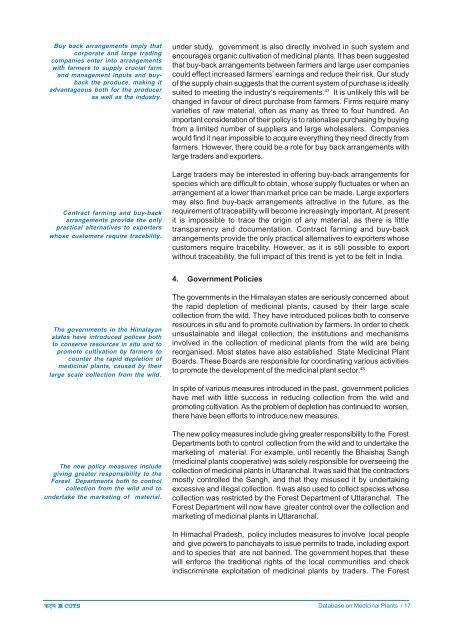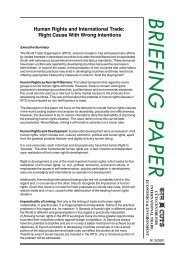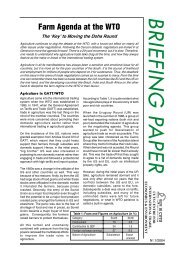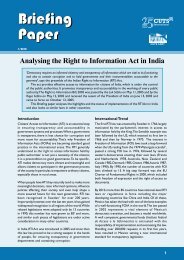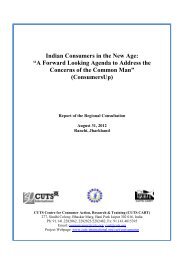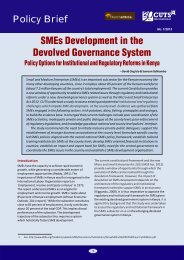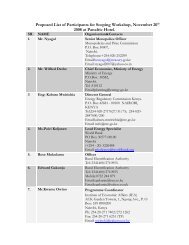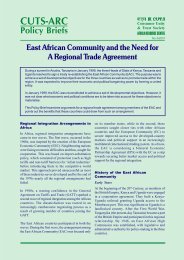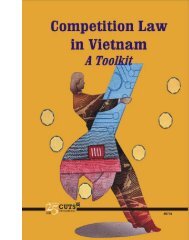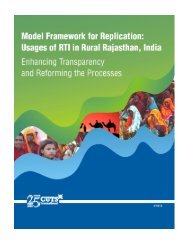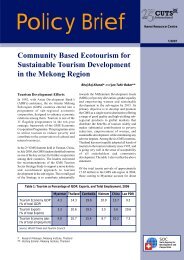Database on Medicinal Plants / 1 - Consumer Unity & Trust Society
Database on Medicinal Plants / 1 - Consumer Unity & Trust Society
Database on Medicinal Plants / 1 - Consumer Unity & Trust Society
Create successful ePaper yourself
Turn your PDF publications into a flip-book with our unique Google optimized e-Paper software.
Buy back arrangements imply thatcorporate and large tradingcompanies enter into arrangementswith farmers to supply crucial farmand management inputs and buybackthe produce, making itadvantageous both for the produceras well as the industry.C<strong>on</strong>tract farming and buy-backarrangements provide the <strong>on</strong>lypractical alternatives to exporterswhose customers require tracebility.under study, government is also directly involved in such system andencourages organic cultivati<strong>on</strong> of medicinal plants. It has been suggestedthat buy-back arrangements between farmers and large user companiescould effect increased farmers’ earnings and reduce their risk. Our studyof the supply chain suggests that the current system of purchase is ideallysuited to meeting the industry’s requirements. 47 It is unlikely this will bechanged in favour of direct purchase from farmers. Firms require manyvarieties of raw material, often as many as three to four hundred. Animportant c<strong>on</strong>siderati<strong>on</strong> of their policy is to rati<strong>on</strong>alise purchasing by buyingfrom a limited number of suppliers and large wholesalers. Companieswould find it near impossible to acquire everything they need directly fromfarmers. However, there could be a role for buy back arrangements withlarge traders and exporters.Large traders may be interested in offering buy-back arrangements forspecies which are difficult to obtain, whose supply fluctuates or when anarrangement at a lower than market price can be made. Large exportersmay also find buy-back arrangements attractive in the future, as therequirement of traceability will become increasingly important. At presentit is impossible to trace the origin of any material, as there is littletransparency and documentati<strong>on</strong>. C<strong>on</strong>tract farming and buy-backarrangements provide the <strong>on</strong>ly practical alternatives to exporters whosecustomers require tracebility. However, as it is still possible to exportwithout traceability, the full impact of this trend is yet to be felt in India.4. Government PoliciesThe governments in the Himalayanstates have introduced polices bothto c<strong>on</strong>serve resources in situ and topromote cultivati<strong>on</strong> by farmers tocounter the rapid depleti<strong>on</strong> ofmedicinal plants, caused by theirlarge scale collecti<strong>on</strong> from the wild.The governments in the Himalayan states are seriously c<strong>on</strong>cerned aboutthe rapid depleti<strong>on</strong> of medicinal plants, caused by their large scalecollecti<strong>on</strong> from the wild. They have introduced polices both to c<strong>on</strong>serveresources in situ and to promote cultivati<strong>on</strong> by farmers. In order to checkunsustainable and illegal collecti<strong>on</strong>, the instituti<strong>on</strong>s and mechanismsinvolved in the collecti<strong>on</strong> of medicinal plants from the wild are beingreorganised. Most states have also established State <strong>Medicinal</strong> PlantBoards. These Boards are resp<strong>on</strong>sible for coordinating various activitiesto promote the development of the medicinal plant sector. 48In spite of various measures introduced in the past, government policieshave met with little success in reducing collecti<strong>on</strong> from the wild andpromoting cultivati<strong>on</strong>. As the problem of depleti<strong>on</strong> has c<strong>on</strong>tinued to worsen,there have been efforts to introduce new measures.The new policy measures includegiving greater resp<strong>on</strong>sibility to theForest Departments both to c<strong>on</strong>trolcollecti<strong>on</strong> from the wild and toundertake the marketing of material.The new policy measures include giving greater resp<strong>on</strong>sibility to the ForestDepartments both to c<strong>on</strong>trol collecti<strong>on</strong> from the wild and to undertake themarketing of material. For example, until recently the Bhaishaj Sangh(medicinal plants cooperative) was solely resp<strong>on</strong>sible for overseeing thecollecti<strong>on</strong> of medicinal plants in Uttaranchal. It was said that the c<strong>on</strong>tractorsmostly c<strong>on</strong>trolled the Sangh, and that they misused it by undertakingexcessive and illegal collecti<strong>on</strong>. It was also used to collect species whosecollecti<strong>on</strong> was restricted by the Forest Department of Uttaranchal. TheForest Department will now have greater c<strong>on</strong>trol over the collecti<strong>on</strong> andmarketing of medicinal plants in Uttaranchal.In Himachal Pradesh, policy includes measures to involve local peopleand give powers to panchayats to issue permits to trade, including exportand to species that are not banned. The government hopes that thesewill enforce the traditi<strong>on</strong>al rights of the local communities and checkindiscriminate exploitati<strong>on</strong> of medicinal plants by traders. The Forest<str<strong>on</strong>g>Database</str<strong>on</strong>g> <strong>on</strong> <strong>Medicinal</strong> <strong>Plants</strong> / 17


